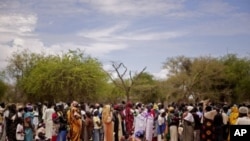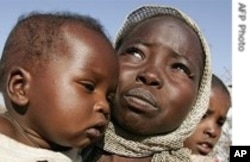With Sudan set to split into two countries on July 9, experts and advocates are asking what’s next for north and south Sudan.
In a briefing Thursday sponsored by Humanity United and Crisis Action, a group of them raised concerns about the volatile situations in Abyei and Southern Kordofan State and the ongoing conflict in Darfur in western Sudan.
Human rights violations
Jehanne Henry, chief researcher on Sudan for Human Rights Watch, expressed concern for civilians in Southern Kordofan State.
“One of the main calls that we’ve been making, and so has the…[U.N.] Office of the High Commissioner for Human Rights,” she said, “is for an independent human rights investigation to take place immediately before UNMIS leaves on the 9th.”
UNMIS is the U.N. force in Sudan.
“It looks as though we’re facing a situation after the 9th [of July] where that investigation will be even harder to come by. Whether it’s conducted by the United Nations or the African Union or some other body, just to get basic information out and to try to open up more humanitarian access,” she said.
Human Rights Watch and other groups say the Khartoum government is refusing access to humanitarian agencies.
Abyei
Fighting in the oil-rich Abyei region erupted in May. Just how oil revenues will be divided remains unclear because an agreement on the matter between north and south has yet to be reached. But the two sides have agreed to try to keep the peace there after northern Sudanese forces withdraw.
“The parties did broker an agreement, which does include an external force, which is the Ethiopian peacekeeping troops,” said Henry. “It remains to be seen how the Sudanese government will abide by this.”
Darfur
While the south is poised to gain independence, in western Sudan the Darfur conflict remains unresolved.
“Darfur is basically off the news now and it’s fast becoming forgotten. But we do see that on the ground the situation has deteriorated. It has not improved, mainly because the government and rebel forces have resumed fighting in the last six months,” said Henry.
Major clashes have been reported recently in the Jebal Marra area in North Darfur State.
“So that conflict continues to roil in the background, sometimes with very large numbers of casualties reported,” said Henry.
Only the beginning
While independence marks the end of a long struggle for southern Sudan, it is by no means an end to the many problems it faces. This includes internal fighting between the SPLA and southern armed groups and ethnic tensions.
“But I want to say that it is a solvable puzzle. The differences are actually small. They are bridgeable. War is not inevitable. So this is something that we feel the international community can play a pretty large role in the success of this new independent country,” said Gerald Martone, director of humanitarian affairs at the International Rescue Committee.
Issues with northern Sudan, however, are more daunting.
“Our biggest concerns, of course, are the north and the south, their continued unresolved issues between these countries. They are in fact mutually dependent on each other. Neither one can survive without the other. And that’s largely because of oil revenues,” he said.
A worst case scenario, he said, would be a return to war. The conflict that ended with the 2005 signing of the Comprehensive Peace Agreement lasted more than 20 years and claimed millions of lives.
Uniting against a common enemy is one thing, remaining united in peace quite another.
“The many factions within south Sudan were united against the universal rival to the north,” he said.“But now that rival is gone and we really fear that the country needs to come together, that rather than being united against something they must be united for something. The Government of South Sudan is no longer a liberation movement. It is a national government.”
The challenge, he said, for the southern government is not to become what it rebelled against – an “over centralized government…autocratic, authoritarian regime.”
Military response
Southern military response has been somewhat restrained in Abyei and Southern Kordofan State. But Jon Temin, director of the Sudan program at the U.S. Institute of Peace, questions whether that will change.
“The southern leadership has really done well in getting to July 9th and in sending the message that our top priority is to get to July 9th and to get to independence,” he said, “and that has meant that they’ve held off from getting engaged in some of the violence that we’ve seen around the border.”
But Temin added, “It is possible that one of their early acts as a fully sovereign country will be to get more militarily engaged in some of the violence around the border and so that’s something to watch.”
Non-military issues before the new government include writing a new constitution, reported high levels of corruption and problems with a national army.
“What’s particularly important here is that the international community send a clear message to the southern leadership really from day one that they’re going to be held to the same standards as just about anybody else in the world. And that there aren’t going to be any free passes. There aren’t going to be any blank checks,” he said.
The north
Temin said “hardliners” are in control of the Khartoum government as the south gains independence.
“What they are probably trying to do is to send a very clear message to the north that they are in control and that there is not the possibility of any other sort of follow-on secession efforts. But there is the question, and I don’t know the answer, about whether they are trying to push the border any further south. Whether they are trying to gain more control over some of the oil fields that are right along the border, but on the southern side.”
Northern Sudan may feel the loss of the south mostly in economic terms.
“The economic impact of southern secession in the north cannot be underestimated. And it’s a real point of weakness and concern for the Khartoum leadership. Just a couple of weeks ago the northern finance minister estimated that they’ll lose something like 37 percent of their revenue when the south secedes, because of the oil losses,” he said.
However, Temin said that estimate could be too low.






